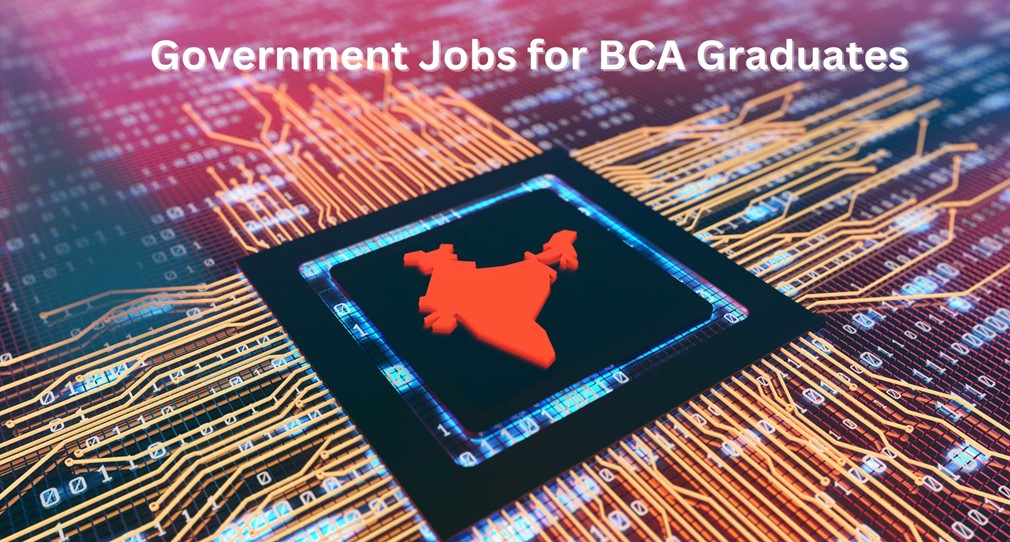Navigating the world after completing a Bachelor of Computer Applications (BCA) can seem like uncharted territory. But the truth is, with a BCA under your belt, the world becomes a treasure trove of opportunities, waiting for you to explore. Let’s unravel the various avenues available to you.
MCA: The Direct Evolution of BCA Career Paths

For many, a Master of Computer Applications (MCA) seems like the logical next step after a BCA. This 2-year PG programme offers specialisations in Application Software, Management Information Systems (MIS), Software Development, and more.
The allure is clear; combining both a BCA and MCA makes one a sought-after candidate during recruitment drives at many tech and non-tech companies. Imagine wearing the dual hats of a Network Engineer and a Test Engineer, or perhaps, delving deep into the realms of a Database Administrator.
Popular MCA Specialisations Post-BCA:
- Application Software: Primarily concerned with crafting software applications suited for various platforms.
- Management Information Systems (MIS): Focuses on the art of managing intricate information systems within organisations.
- Software Development: A deep dive into crafting software using robust languages like Java, C++, and Python.
- Networking: Get acquainted with the architecture, protocols, and security of computer networks.
- Systems Management: Become the maestro of IT systems, understanding project management nuances and IT service intricacies.
The average remuneration for those embarking on their BCA Careers in India starts at a promising INR 2 – 9 LPA. It’s a rewarding start, given the niche expertise they bring to the table.
With a rigorous grounding in computer applications, MCA graduates inherently possess a robust skill set that’s growing increasingly valuable in today’s digital landscape. Current data from Payscale underscores this trend, revealing that the average MCA graduate in India enjoys a salary of around INR 6.5 LPA.
And here’s the icing on the cake: if you’re stepping into a top IT company with a decent chunk of experience under your MCA belt, your salary could soar up to a whopping INR 15 LPA!
Opportunities after Bachelor of Computer Applications in the IT Sector

Top-tier IT companies like TCS, Infosys, and Wipro open their doors wide for BCA graduates.
As a BCA degree holder, you can venture into roles such as a Software Developer, IT Analyst, or System Engineer.
Let’s delve into some of the most coveted roles that beckon BCA graduates:
- Software Developer: One of the primary BCA Careers, as a software developer, you’ll design, develop, test, and uphold various software applications.
Interesting Fact: Did you know that India is currently the hub for software services, with the IT sector employing over 4.36 million people?
- Database Administrator: A key component in any business, database administrators ensure data integrity as they manage and maintain databases.
- System Administrator: The unsung heroes behind any seamless IT infrastructure, system administrators manage and oversee computer systems.
- Computer Support Service Specialist: Ever been thankful for that tech guru who saved your day? As a computer support service specialist, you’ll provide that pivotal technical support to users.
Some specialised roles BCA graduates can apply for are:

- IT Analyst: A pivotal position in the modern business landscape, IT analysts bridge the gap between technology and business by analyzing requirements and sculpting apt IT solutions.
- Data Analysts and Scientists: Crunching numbers to reveal business insights? That’s the day in the life of data analysts and scientists.
- Quiz Time: Given the boom in digital data, can you guess how many zettabytes of data will be in the digital universe by 2025?
- AI and Machine Learning Specialists: In an age driven by automation, AI and machine learning specialists lead the charge, crafting algorithms that empower machines to think.
- Software and Application Developers: Beyond the basic software developer role, specializing further in this domain lets you shape groundbreaking applications tailored for specific platforms or needs.
- Digital Transformation Specialists: With businesses increasingly moving to digital platforms, these specialists are the torchbearers of digital metamorphosis.
- Cloud Computing Specialists: As businesses migrate to the cloud, experts in this domain design, deploy, and manage cloud-based solutions, ensuring scalability and efficiency.
In conclusion, the trajectory of BCA Careers and the myriad opportunities post the course are both diverse and promising. Remember, continuous upskilling and adapting to industry changes will set you apart in these competitive roles. Best of luck, future tech mavens!
But remember, while your degree is the key, continuously upskilling and mastering relevant technical skills remain the lock mechanism.
Quick Quiz: Can you name three programming languages essential for a Software Developer role? (Hint: Two are mentioned above!)
BCA Careers in Government: A Blend of Tech and Service

Believe it or not, a BCA doesn’t just propel you into the corporate world. Various government sectors like UPSC, SSC, and IBPS are on a constant lookout for tech-savvy BCA graduates. With a government job, not only do you get to flex your tech muscles but also enjoy handsome pay with unparalleled perks.
With the Indian government rolling out flagship programmes such as Digital India and Make in India, the arena for IT professionals is buzzing with opportunities.
For those treading the BCA career paths, this translates into promising roles within government entities that are actively driving the digital revolution – from strengthening digital infrastructure to ushering in a new era of e-governance and seamless digital service delivery.
Based on insights from FreshersNow.Com, prominent government entities like MGNREGA, BPSSC, NHM, RDD Jharkhand, NIMHANS, and others have recently issued their Government BCA Notifications for 2023. This is heartening news for both newcomers and seasoned professionals who are BCA graduates.
Interesting Fact: According to recent statistics, there’s been a 15% increase in BCA graduates joining the Indian government sector in the last five years.
Venturing Beyond Tech: MBA after BCA

Pivoting towards a Master’s in Business Administration (MBA) after BCA might seem offbeat, but the results can be extraordinary. By coupling the tech knowledge of a BCA with the managerial insights of an MBA, you’re poised to occupy coveted leadership roles in premier organisations. This hybrid skill set can be the very edge needed to make impactful decisions and lead effectively.
Your MBA specialisation can act as a compass in such a scenario. If you’ve delved deep into IT during your MBA, roles like IT Manager or IT Governance Executive could be right up your alley.
Delving into Machine Learning with Python

Machine Learning is revolutionising the digital sector. With its emphasis on Python and Statistics, BCA graduates can be at the forefront of this change.
Machine learning’s applications are vast – from object recognition to predictive analytics. As the tech world leans heavily on data-driven insights, mastering machine learning with Python could be your golden ticket.
For those with a keen knowledge of Machine Learning, Python, and Statistics, the realm of IT and technology presents a plethora of job roles, each more exciting than the next. Here’s a closer look:
1. Machine Learning Engineer
Machine Learning Engineers craft algorithms, enabling computers to undertake specific tasks without predetermined programming. They employ an array of data handling methods combined with machine learning frameworks to design and hone algorithms suited for prediction, classification, and data processing.
The corporate landscape’s shift towards automation and deriving sense from colossal datasets has seen a rising demand for specialists adept at sculpting effective machine learning models.
2. Robotics Engineer
Robotics Engineers conceive, construct, and ensure the smooth operation of robots. Their main focus lies in mechanising tasks which could pose risks or become monotonous for individuals, guaranteeing the harmonious integration of robot software and hardware.
Given the technological leaps and the urgency for automation in domains like healthcare and manufacturing, the relevance of robots is on the upswing, fuelling the need for proficient robotics engineers.
3. Natural Language Processing (NLP) Scientist
NLP Scientists grapple with the intricacies of equipping machines with the aptitude to comprehend, interpret, and generate human speech. This encapsulates challenges like sentiment interpretation, crafting chatbots, and facilitating language conversions.
With organisations striving to polish user interactions and simplify client communications, the urgency for evolved chatbots and linguistic tools is on the rise.
4. Software Developer
Software Developers sketch, code, scrutinise, and uphold software application blueprints. Particularly, those well-acquainted with Python can exploit its adaptability for web crafting, and task automation, among other pursuits.
The prevailing wave of digital metamorphosis ensures an unwavering demand for software creators, more so for those adept in widely-recognised languages, such as Python.
5. Data Scientist
Data Scientists distil valuable insights from both organised and chaotic data sources. By harnessing statistical techniques, machine learning, and prognostic models, they arm businesses with the knowledge to make judicious choices.
In today’s epoch, where decisions hinge on data, firms spanning diverse sectors are in pursuit of data scientists to help navigate the expansive seas of data.
6. Cybersecurity Analyst
Cybersecurity Analysts stand as guardians against online perils. Their tasks span from scrutinising network activities, and spotting system weak points, to thwarting security infringements, and ensuring the sanctity of data remains intact.
With cyber threats evolving in complexity, the quest for experts adept at shielding pivotal data and systems has become crucial.
7. Artificial Intelligence (AI) Engineer
AI Engineers construct algorithms and predictive frameworks to emulate human thought processes. Their expertise lies in forging AI models primed to dissect data, assimilate from it, and make independent resolutions.
Given AI’s permeation across sectors ranging from healthcare to banking, the quest for accomplished AI engineers is gaining momentum.
Conclusion
In wrapping up, BCA Careers don’t merely adhere to a fixed path. They encapsulate discovery, proficiency, and at times, a complete paradigm shift. So, gear up for the future and grasp the boundless prospects on the horizon.

